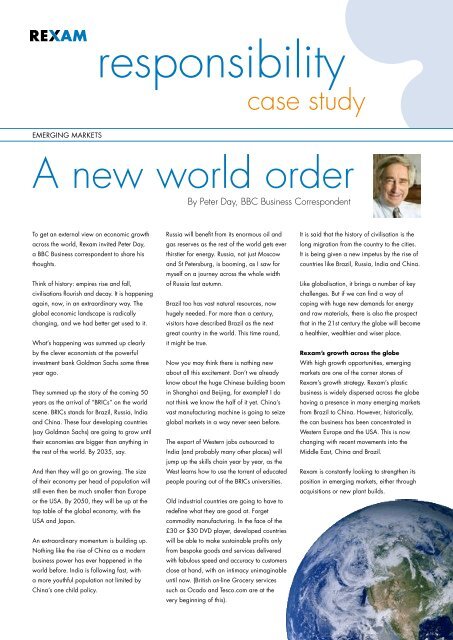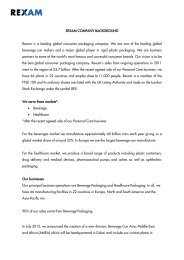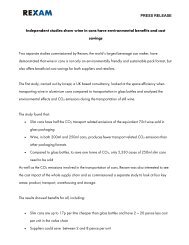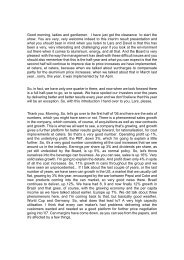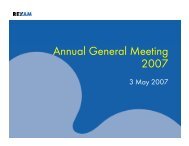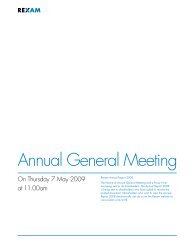All case studies
All case studies
All case studies
You also want an ePaper? Increase the reach of your titles
YUMPU automatically turns print PDFs into web optimized ePapers that Google loves.
EMERGING MARKETS<br />
A new world order<br />
By Peter Day, BBC Business Correspondent<br />
To get an external view on economic growth<br />
across the world, Rexam invited Peter Day,<br />
a BBC Business correspondent to share his<br />
thoughts.<br />
Think of history: empires rise and fall,<br />
civilisations flourish and decay. It is happening<br />
again, now, in an extraordinary way. The<br />
global economic landscape is radically<br />
changing, and we had better get used to it.<br />
What’s happening was summed up clearly<br />
by the clever economists at the powerful<br />
investment bank Goldman Sachs some three<br />
year ago.<br />
They summed up the story of the coming 50<br />
years as the arrival of “BRICs” on the world<br />
scene. BRICs stands for Brazil, Russia, India<br />
and China. These four developing countries<br />
(say Goldman Sachs) are going to grow until<br />
their economies are bigger than anything in<br />
the rest of the world. By 2035, say.<br />
And then they will go on growing. The size<br />
of their economy per head of population will<br />
still even then be much smaller than Europe<br />
or the USA. By 2050, they will be up at the<br />
top table of the global economy, with the<br />
USA and Japan.<br />
An extraordinary momentum is building up.<br />
Nothing like the rise of China as a modern<br />
business power has ever happened in the<br />
world before. India is following fast, with<br />
a more youthful population not limited by<br />
China’s one child policy.<br />
responsibility<br />
<strong>case</strong> study<br />
Russia will benefit from its enormous oil and<br />
gas reserves as the rest of the world gets ever<br />
thirstier for energy. Russia, not just Moscow<br />
and St Petersburg, is booming, as I saw for<br />
myself on a journey across the whole width<br />
of Russia last autumn.<br />
Brazil too has vast natural resources, now<br />
hugely needed. For more than a century,<br />
visitors have described Brazil as the next<br />
great country in the world. This time round,<br />
it might be true.<br />
Now you may think there is nothing new<br />
about all this excitement. Don’t we already<br />
know about the huge Chinese building boom<br />
in Shanghai and Beijing, for example? I do<br />
not think we know the half of it yet. China’s<br />
vast manufacturing machine is going to seize<br />
global markets in a way never seen before.<br />
The export of Western jobs outsourced to<br />
India (and probably many other places) will<br />
jump up the skills chain year by year, as the<br />
West learns how to use the torrent of educated<br />
people pouring out of the BRICs universities.<br />
Old industrial countries are going to have to<br />
redefine what they are good at. Forget<br />
commodity manufacturing. In the face of the<br />
£30 or $30 DVD player, developed countries<br />
will be able to make sustainable profits only<br />
from bespoke goods and services delivered<br />
with fabulous speed and accuracy to customers<br />
close at hand, with an intimacy unimaginable<br />
until now. (British on-line Grocery services<br />
such as Ocado and Tesco.com are at the<br />
very beginning of this).<br />
It is said that the history of civilisation is the<br />
long migration from the country to the cities.<br />
It is being given a new impetus by the rise of<br />
countries like Brazil, Russia, India and China.<br />
Like globalisation, it brings a number of key<br />
challenges. But if we can find a way of<br />
coping with huge new demands for energy<br />
and raw materials, there is also the prospect<br />
that in the 2 st century the globe will become<br />
a healthier, wealthier and wiser place.<br />
Rexam’s growth across the globe<br />
With high growth opportunities, emerging<br />
markets are one of the corner stones of<br />
Rexam’s growth strategy. Rexam’s plastic<br />
business is widely dispersed across the globe<br />
having a presence in many emerging markets<br />
from Brazil to China. However, historically,<br />
the can business has been concentrated in<br />
Western Europe and the USA. This is now<br />
changing with recent movements into the<br />
Middle East, China and Brazil.<br />
Rexam is constantly looking to strengthen its<br />
position in emerging markets, either through<br />
acquisitions or new plant builds.


